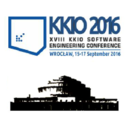KKIO 2016

W dniach 15-17 września odbędzie się kolejna edycja Krajowej Konferencji Inżynierii Oprogramowania (KKIO). W tym roku wydarzenie to organizuje Oddział Dolnośląski PTI.
Podczas pierwszej sesji uczestnicy będą mogli wysłuchać wykładów zaproszonych. Jako pierwszy wystąpi dr Kevin Lano z King’s College, który jest prekursorem zastosowania metod formalnych do projektowania obiektowego. Komercyjne aspekty tworzenia oprogramowania przedstawi Robert Snijder z holenderskiej firmy Teleena. Opowie on o wpływie aktualnych trendów w sektorze IT na sposób tworzenia oprogramowania. Poruszone zostaną między innymi takie kwestie jak: internet rzeczy (IoT), obliczenia poznawcze (cognitive computing), gospodarka okrężna (circular economy), użycie drukarek 3D. W bloku poświęconym naukom społecznym wystąpienie pt. Behind the Scenes of Success: Work-Life Balance wygłosi Małgorzata Rybak.
Kolejne sesje konferencji dotyczyć będą rozmaitych aspektów tworzenia oprogramowania.
Session S2: Requirements and Domain Modeling
- Business rule patterns catalog for structural business rules, Bogumiła Hnatkowska and Jose María Alvarez-Rodriguez
- Sketching use-case scenarios based on use-case goals and patterns, Mirosław Ochodek, Krystian Koronowski, Adam Matysiak, Piotr Miklosik and Sylwia Kopczyńska
- Domain modeling based on requirements specification and ontology, Iwona Dubielewicz, Bogumiła Hnatkowska, Zbigniew Huzar and Lech Tuzinkiewicz
- Semantic validation of UML class diagrams with the use of domain ontologies expressed in OWL 2, Małgorzata Sadowska and Zbigniew Huzar
- RSL-DL: Representing domain knowledge for the purpose of code generation, Kamil Rybiński and Rafał Parol
Session S3: Quality Assurance
- Assessment of the software defect prediction cost effectiveness in an industrial project, Jaroslaw Hryszko and Lech Madeyski
- Dynamic stylometry for defect prediction, Adam Roman and Rafał Babiarz
- Mutant generation for WSDL, Ilona Bluemke and Wojciech Grudziński
- Improving measurement certainty by using calibration to find systematic measurement error – a case of lines-of-code measure, Miroslaw Staron, Darko Durisic and Rakesh Rana
- Performance comparison of CRM systems dedicated to reporting failures to IT department, Hubert Zarzycki, Jacek M. Czerniak, Dawid Lakomski and Piotr Kardasz
Session S4: Discussion Panel: Software Assessment
Session S6: Poster Session
- Designing a data warehouse for changes with Data Vault, Adrian Najczuk and Artur Wilczek
- Experience report: Process of introduction of DevOps into production system, Tomasz Wala, Marek Majchrzak and Jolanta Wrzuszczak-Noga
- Merging textual representations of software models– a practical approach, Ferenc Attila Somogyi and Mark Asztalos
- Data flow analysis for code change propagation in Java programs, Grzegorz Kochański
- The use of web services architecture for engineering calculations based on the webMES platform, Piotr Jeruszka and Andrzej Grosser
- Toward agile data warehousing, Adrian Najczuk and Artur Wilczek
- Zbierane i przetwarzanie danych użytkowników do celów marketingowych, Aneta Poniszewska-Marańda and Jonatan Gostyński
- Zwinne szacowanie pracochłonności w projektach programistycznych – studium przypadków, Maciej Łabędzki, Patryk Promiński, Adam Rybicki, and Marcin Wolski
Session S7: Case study – Semantyczna i syntaktyczna analiza treści w mediach społecznościowych
Session S9: Software Process Improvement
- Software engineering needs agile experimentation: A New "Practice and Supporting Tool, Lech Madeyski and Marcin Kawalerowicz
- An Industrial survey on business analysis problems and solutions, Piotr Marciniak and Aleksander Jarzębowicz
- Beyond software architecture knowledge management tools, Andrzej Zalewski
- A collaborative approach to developing a part-time PhD program in IT architecture with industry cooperation, Jan Werewka
Session S10: Agile Transformations in IT
- Model of RUP processes maturity assessment in IT organizations, Włodzimierz Wysocki, Cezary Orłowski, Artur Ziółkowski and Grzegorz Bocewicz
- Trigger-based model to assess the readiness of IT organizations to agile transformation, Cezary Orłowski, Tomasz Deręgowski, Miłosz Kurzawski, Artur Ziółkowski and Bartosz Chrabski
- The reference model of tools adaptation in the perspective of technological agile transformation in IT organizations, Cezary Orłowski, Bartosz Chrabski, Artur Ziółkowski, Tomasz Deręgowski and Miłosz Kurzawski
- Building project and project team characteristic for creating hybrid management processes, Cezary Orłowski, Tomasz Deręgowski, Miłosz Kurzawski, Artur Ziółkowski and Bartosz Chrabski
Session S11: System Architecture & Development
- Heterogeneous system architecture in education management software, Wiktor Zychla
- Service-Oriented Architecture for integration of information systems at data level, Aneta Poniszewska-Maranda and Patryk Wójcik
- Factors influencing user story estimations: an industrial interview and a conceptual model, Marek Majchrzak and Lech Madeyski
- Performance analysis of web application using MySQL, MongoDB and Redis databases, Krzysztof Miśtal, Ziemowit Nowak
Session S12: Testing & Defect prediction
- Postgraduate Studies on software testing in Poland, Lucjan Stapp, Adam Roman and Maciej Chmielarz
- Software metrics in Boa large-scale software mining infrastructure: challenges and solutions, Agnieszka Patalas, Wojciech Cichowski, Michał Malinka, Wojciech Stępniak, Piotr Maćkowiak and Lech Madeyski
- How to improve linking between issues and commits for the sake of software defect prediction?, Tomasz Gawęda, Ewa Nestorowicz, Oskar Wołk, Lech Madeyski and Marek Majchrzak
- Defect prediction with bad smells in code, Jaroslaw Hryszko, Lech Madeyski, Marta Dabrowska and Piotr Konopka
Strona internetowa konferencji - http://kkio.pti.org.pl